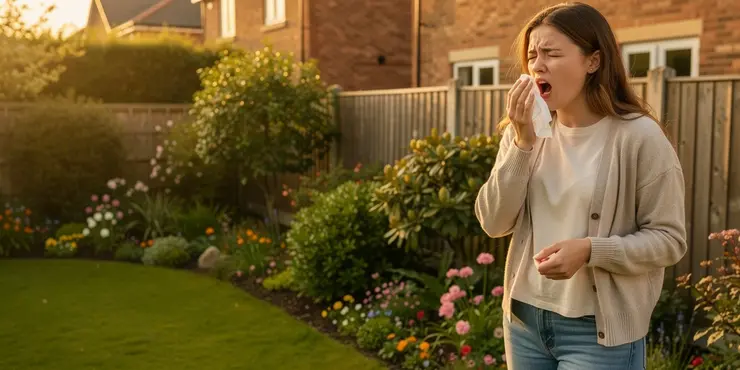
Find Help
More Items From Ergsy search
-
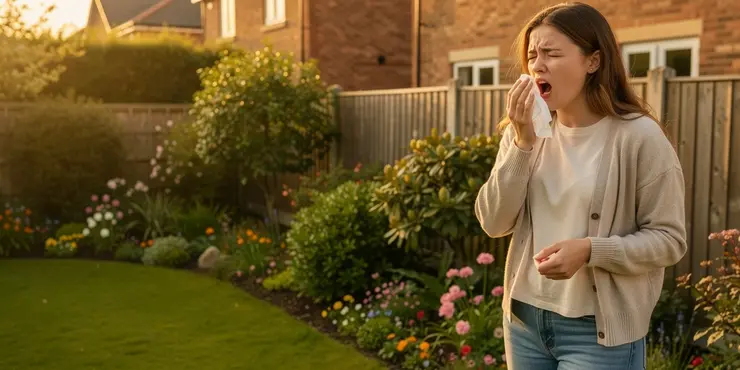
Experts Warn of Rising Hay Fever Cases as Pollen Counts Surge
Relevance: 100%
-
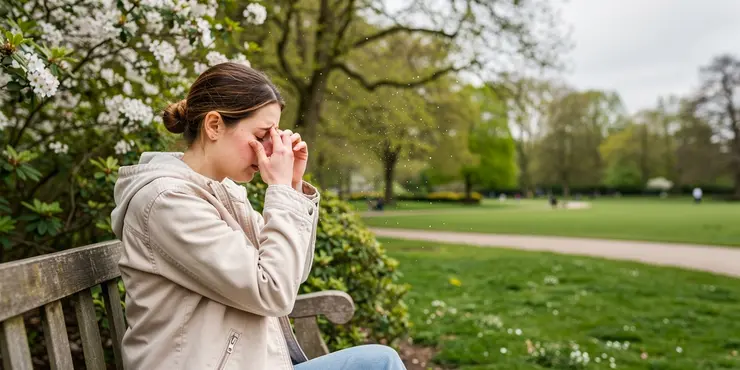
How does pollen affect people with hay fever?
Relevance: 91%
-
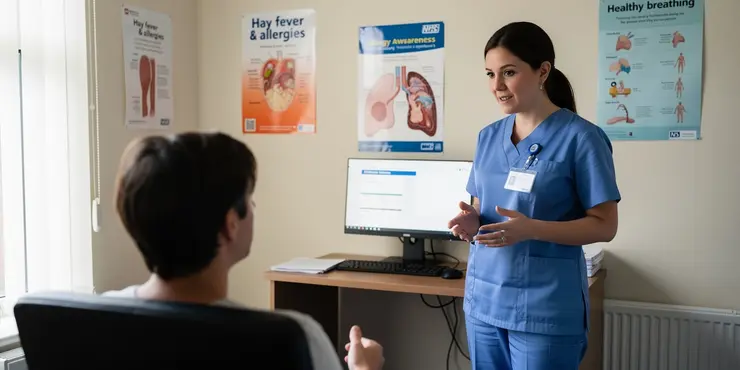
Do all plants produce pollen that causes hay fever?
Relevance: 82%
-

Hay fever advice | NHS
Relevance: 78%
-
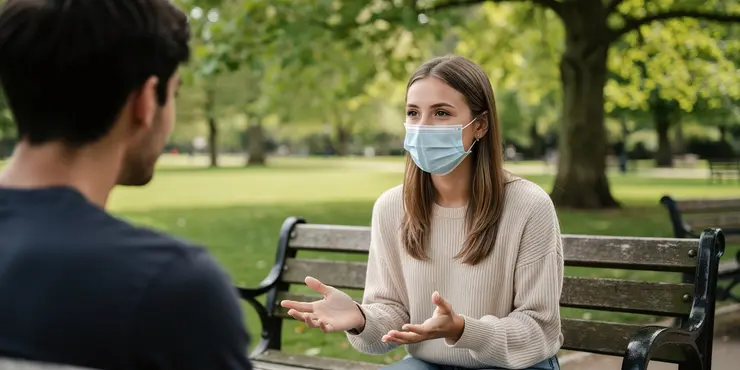
Do masks help with hay fever?
Relevance: 77%
-
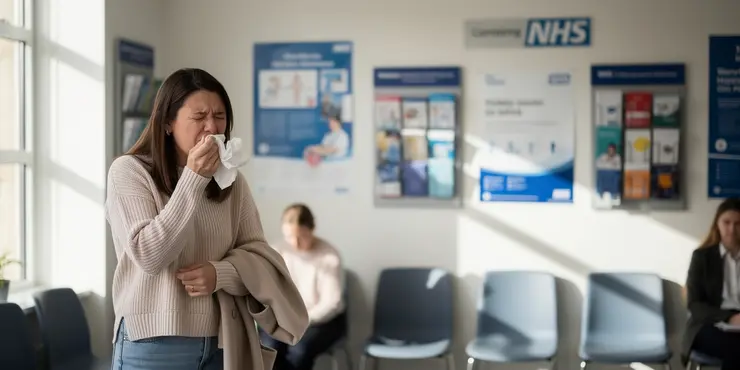
What is hay fever?
Relevance: 76%
-
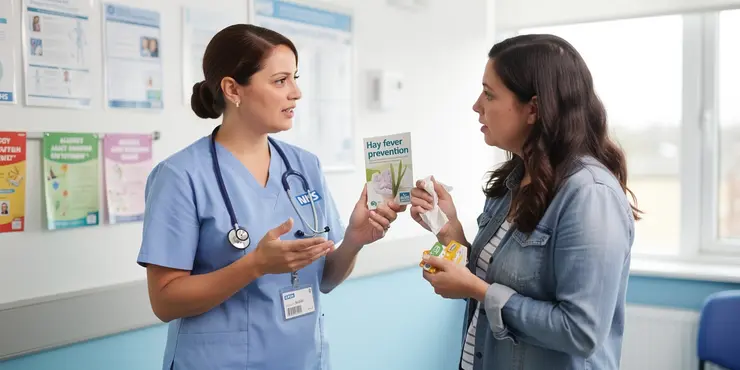
Can hay fever be prevented?
Relevance: 75%
-

How are pollen counts measured?
Relevance: 73%
-
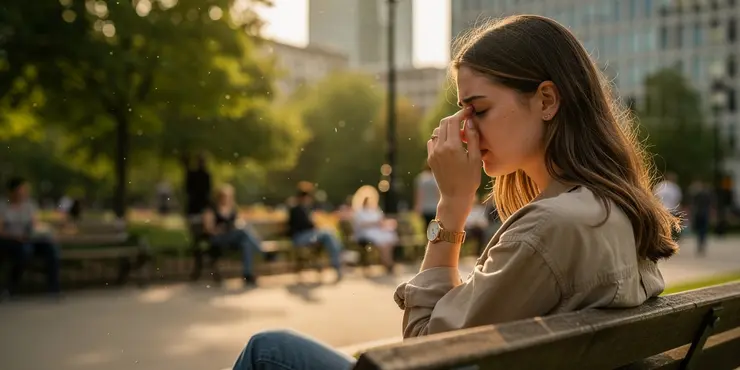
Is hay fever more common in urban areas?
Relevance: 70%
-
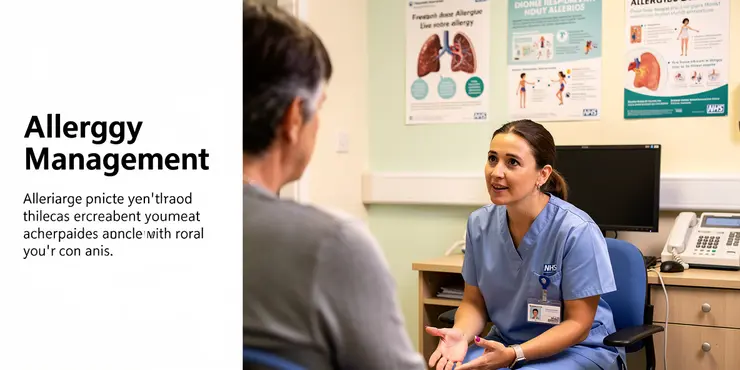
Is there a link between hay fever and asthma?
Relevance: 70%
-
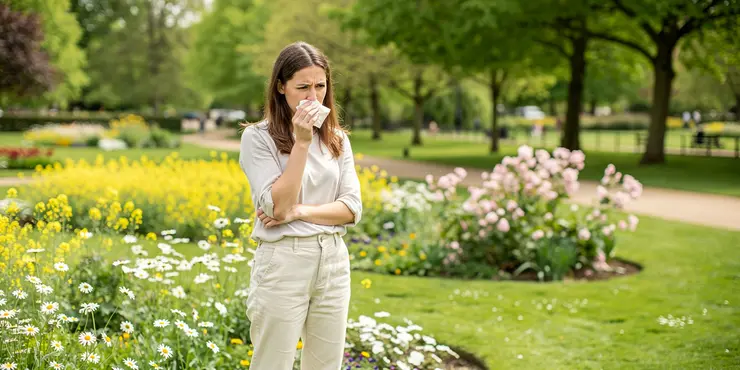
Are some people more prone to hay fever?
Relevance: 69%
-

Why are experts warning of rising hay fever cases?
Relevance: 67%
-
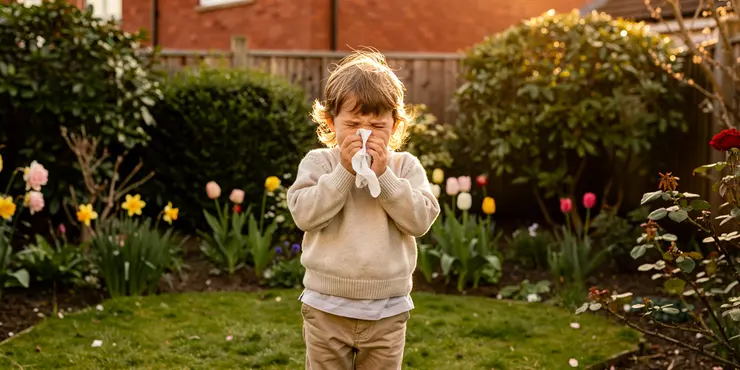
Can children develop hay fever?
Relevance: 67%
-
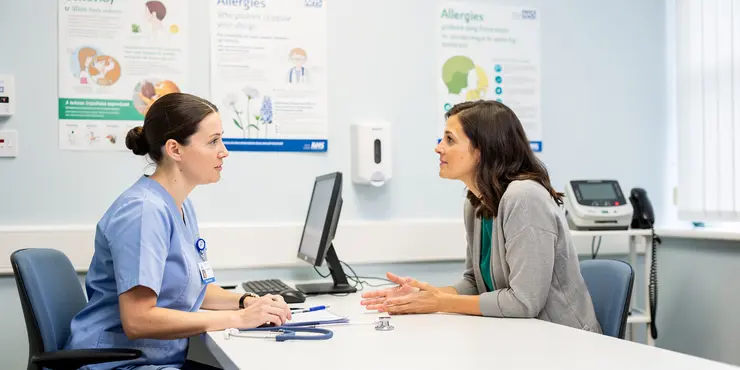
What are the common symptoms of hay fever?
Relevance: 65%
-

Can mosquito screens help reduce hay fever symptoms?
Relevance: 64%
-

Do pets contribute to hay fever?
Relevance: 63%
-

Can hay fever occur year-round?
Relevance: 62%
-
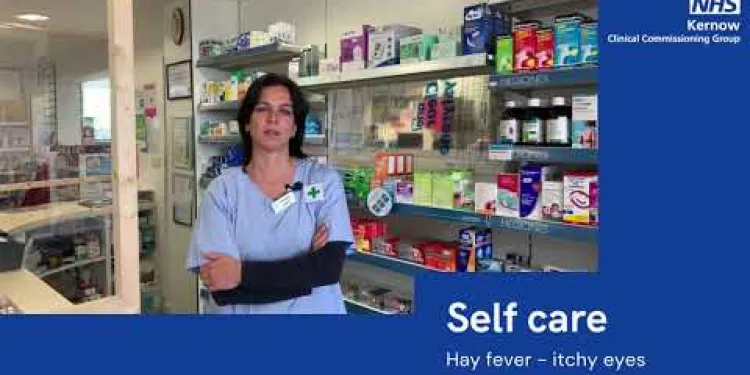
Self care - hay fever itchy eyes
Relevance: 61%
-

Can diet influence hay fever symptoms?
Relevance: 60%
-

Antihistamines how they work with hay fever
Relevance: 58%
-

Can hay fever symptoms mimic other conditions?
Relevance: 57%
-
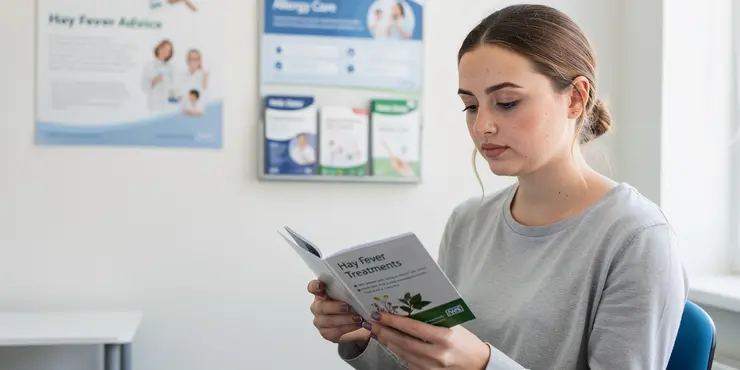
Are there any treatments for hay fever?
Relevance: 52%
-
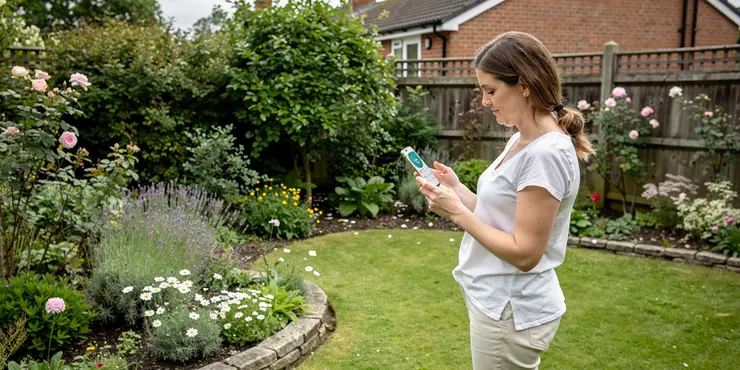
How can I reduce my exposure to pollen?
Relevance: 47%
-
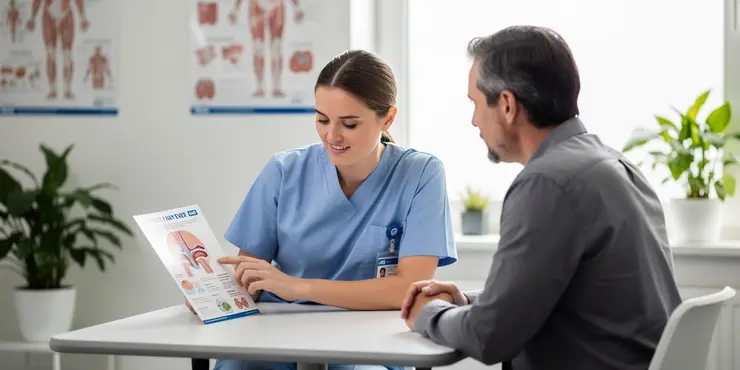
How long does a typical hay fever season last?
Relevance: 43%
-
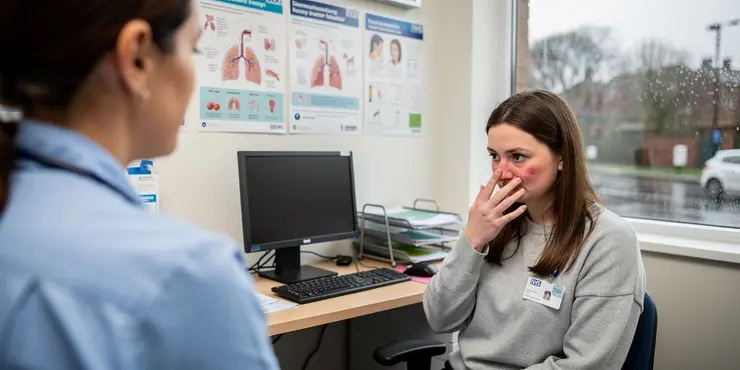
How does climate change affect pollen levels?
Relevance: 41%
-
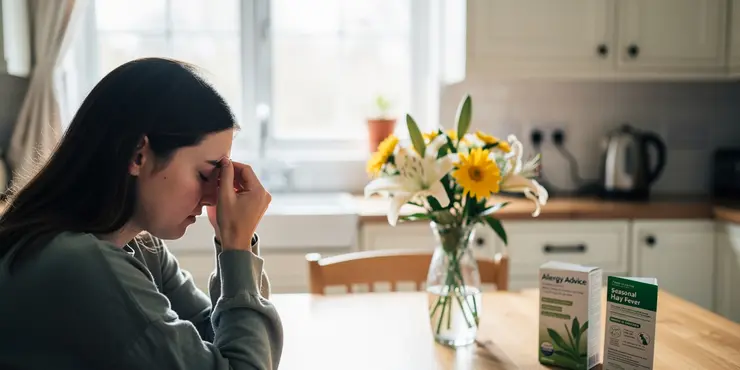
Dealing with Seasonal Allergies
Relevance: 33%
-
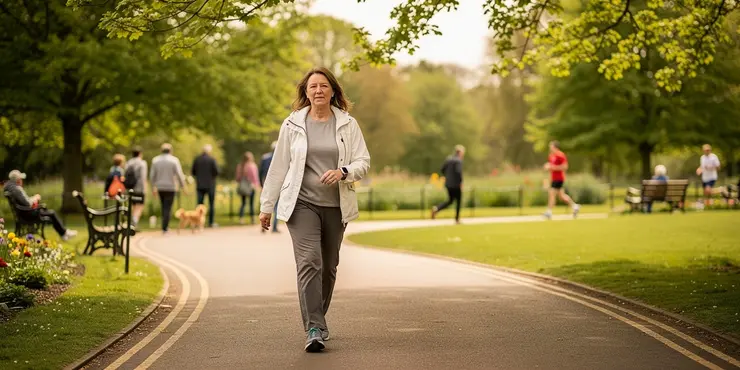
New Study Reveals Surprising Facts About Daily Step Counts
Relevance: 25%
-

Caring for a child with fever | NHS
Relevance: 24%
-

Can bereavement leave be counted against my PTO?
Relevance: 23%
-

Can dengue fever be contracted in the UK?
Relevance: 23%
-
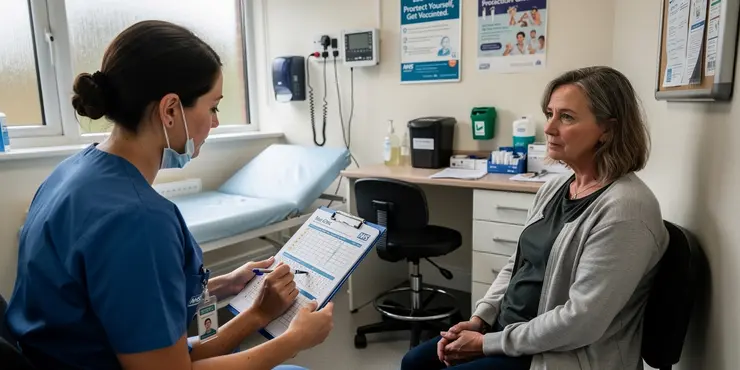
Is there a risk of yellow fever being spread by mosquitoes in the UK?
Relevance: 23%
-

How to treat glandular fever | NHS
Relevance: 23%
-
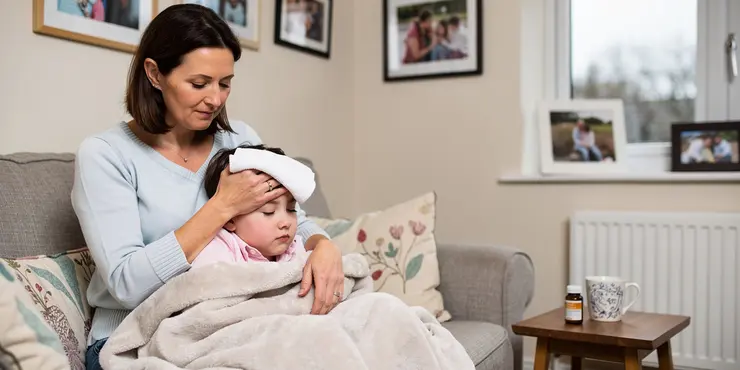
Which medication should be avoided for children with fevers?
Relevance: 22%
-
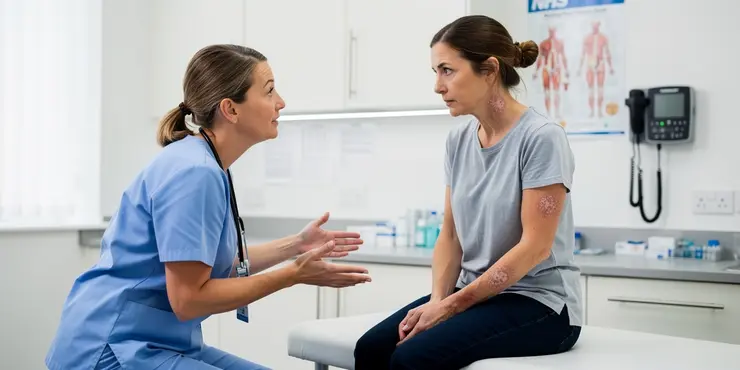
What causes nettle rash?
Relevance: 20%
-
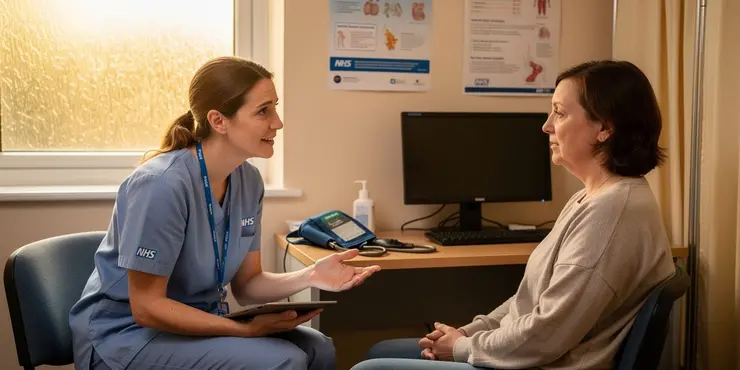
What is Dengue Fever?
Relevance: 20%
-
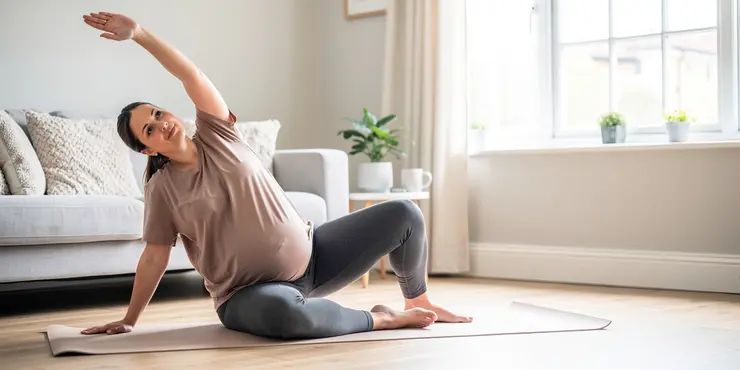
Can lifestyle changes help manage pain and fever during pregnancy?
Relevance: 19%
-
Can Dengue fever be transmitted through blood transfusions?
Relevance: 18%
-

What counts as allowable expenses when calculating CGT?
Relevance: 18%
-
Leukaemia: What are the signs and symptoms? | NHS
Relevance: 15%
-

Who is at risk of developing eczema?
Relevance: 14%
Introduction
As residents across the United Kingdom prepare for warmer weather, experts are issuing warnings about a surge in hay fever cases. With pollen counts hitting new highs, many Brits are expected to experience exacerbated symptoms. Hay fever, also known as allergic rhinitis, is triggered by allergens such as pollen that lead to symptoms including sneezing, runny nose, and itchy eyes. The rise in cases is attributed to several environmental factors affecting pollen levels.
Understanding Hay Fever
Hay fever is an allergic reaction to pollen, typically when it comes into contact with the mouth, nose, eyes, and throat. Pollen is a fine powder from plants, which fertilizes other plants of the same species. Common pollen offenders include grasses, trees, and weeds. In the UK, pollen season is generally divided into three periods: tree pollen in the spring, grass pollen in the late spring to early summer, and weed pollen from early autumn.
Factors Contributing to Rising Pollen Counts
Several factors contribute to the rising pollen counts observed in recent years. Climate change plays a significant role, with warmer temperatures leading to longer growing seasons for plants, thereby increasing pollen production. Additionally, urbanization and air pollution can exacerbate the situation. Pollutants can make pollen more potent or extend its reach, elevating the likelihood of allergic reactions.
Impact on Public Health
The increase in hay fever cases poses a significant public health challenge. Individuals suffering from hay fever may experience disrupted sleep, reduced productivity at work or school, and a diminished quality of life. Furthermore, hay fever can exacerbate asthma symptoms and lead to more severe respiratory issues. The financial burden on the healthcare system is also likely to increase as more people seek medical advice and treatments.
Mitigation and Management Strategies
To manage hay fever symptoms, experts recommend several strategies. Staying indoors on high pollen days, using air filters, and keeping windows closed can help reduce exposure. Over-the-counter medications such as antihistamines and nasal corticosteroids can alleviate symptoms. It's also beneficial to consult a healthcare provider for personalized advice. Additionally, planting low-pollen-producing plants in gardens may help to minimize pollen exposure locally.
Conclusion
The rising pollen counts and subsequent increase in hay fever cases present a growing concern for the UK population. Understanding the factors behind this trend and implementing practical measures can help individuals manage symptoms effectively. With expert advice and a proactive approach, it's possible to mitigate the impacts of this seasonal allergy and maintain a good quality of life during the warmer months.
Introduction
People in the UK are getting ready for warmer weather. But experts warn there will be more hay fever. This is because of lots of pollen. Pollen can make sneezing, runny noses, and itchy eyes worse. Hay fever happens when pollen gets in the air. This is called allergic rhinitis. Pollen levels are going up because of changes in nature.
Understanding Hay Fever
Hay fever happens when you are allergic to pollen. This usually happens when pollen gets in your mouth, nose, eyes, and throat. Pollen is a tiny powder from plants. It helps plants grow. Grass, trees, and weeds make pollen. In the UK, pollen season has three times: tree pollen in spring, grass pollen in late spring to early summer, and weed pollen in early autumn.
Why Pollen Counts Are Rising
There are a few reasons why pollen counts are going up. Climate change makes warmer weather. This means plants can grow for longer. So, they make more pollen. Cities and pollution can make things worse too. Pollution can make pollen stronger and travel further. This means more people get allergies.
How It Affects Health
More hay fever is bad for public health. People with hay fever can have trouble sleeping. They might not do well at work or school. They can feel less happy. Hay fever can also make asthma worse. This can cause big breathing problems. More people might need to see a doctor or get medicine. This costs more money.
How to Handle Hay Fever
Experts have tips to help with hay fever. Stay inside when there is a lot of pollen. Use air filters and keep windows shut to avoid pollen. Medicines like antihistamines can help. You should also talk to a doctor for more tips. Planting plants that make less pollen can help your garden too.
Conclusion
Pollen is rising, and there are more hay fever cases in the UK. Knowing why this happens and what to do can help people feel better. With good advice and being ready, people can deal with this allergy and enjoy the warm months.
Frequently Asked Questions
What is hay fever?
Hay fever, also known as allergic rhinitis, is an allergic reaction to airborne substances such as pollen that affect the nose.
Why are experts warning of rising hay fever cases?
Experts are warning of rising hay fever cases due to an increase in pollen counts, which is likely driven by climate change and longer growing seasons.
How does pollen affect people with hay fever?
Pollen can trigger allergic reactions in individuals with hay fever, causing symptoms such as sneezing, itchy eyes, and runny noses.
What are the common symptoms of hay fever?
Common symptoms of hay fever include sneezing, runny or blocked nose, itchy eyes, and a sore throat.
Can hay fever occur year-round?
Yes, hay fever can occur year-round, especially for individuals allergic to pollen types that are present year-round or due to multiple pollen waves.
How are pollen counts measured?
Pollen counts are measured using air sampling devices that capture pollen grains in the air over a specific period.
Are there any treatments for hay fever?
Yes, treatments for hay fever include antihistamines, nasal sprays, and eye drops that can help alleviate symptoms.
Can hay fever be prevented?
While hay fever cannot be entirely prevented, reducing exposure to pollen and taking preventive medications can help manage symptoms.
Is hay fever more common in urban areas?
Hay fever can be more noticeable in urban areas due to higher levels of pollutants that can exacerbate symptoms, even though pollen itself is more prevalent in rural areas.
How does climate change affect pollen levels?
Climate change can lead to higher temperatures and longer growing seasons, resulting in increased pollen production and longer pollen seasons.
Do all plants produce pollen that causes hay fever?
No, only certain plants produce pollen that is lightweight and easily carried by the wind, which can cause hay fever.
How can I reduce my exposure to pollen?
You can reduce exposure to pollen by staying indoors during high pollen counts, keeping windows closed, and using air purifiers.
Are some people more prone to hay fever?
Yes, individuals with a family history of allergies or asthma are more prone to developing hay fever.
Can children develop hay fever?
Yes, children can develop hay fever, and it is one of the most common childhood allergies.
Is there a link between hay fever and asthma?
Yes, there is a link between hay fever and asthma, as both can be triggered by allergens and may occur together.
Do pets contribute to hay fever?
Pets do not directly cause hay fever, but they can carry pollen on their fur, contributing to exposure.
Can diet influence hay fever symptoms?
Certain foods can exacerbate hay fever symptoms in some individuals due to cross-reactivity between pollen and food proteins.
How long does a typical hay fever season last?
A typical hay fever season can last several months, depending on weather conditions and types of pollen prevalent in the area.
Do masks help with hay fever?
Yes, wearing masks can help reduce the inhalation of pollen and may alleviate symptoms for some hay fever sufferers.
Can hay fever symptoms mimic other conditions?
Yes, hay fever symptoms can mimic the common cold or other respiratory conditions, making accurate diagnosis important.
What is hay fever?
Hay fever is when your nose gets stuffy and you sneeze a lot. It happens because your body thinks pollen from plants is making you sick. This is called an allergy.
If you have hay fever, you might feel itchy or get a runny nose in spring or summer.
To feel better, you can stay indoors when there's lots of pollen outside. Ask an adult to help you find medicine.
Hay fever makes your nose feel bad because of things in the air. These things can be pollen from plants. It is also called allergic rhinitis.
Why are experts saying more people will have hay fever?
Experts think more people will get hay fever. This is because of changes in the environment. Hay fever makes your eyes itchy and your nose runny.
If you have hay fever, try using tissues and washing your hands to feel better. You can also ask a grown-up for medicine.
Experts say more people are getting hay fever. This is because there is more pollen in the air. The pollen is in the air longer because the weather is changing.
What does pollen do to people with hay fever?
Pollen can make people with hay fever feel unwell. Their eyes might get itchy and watery. They might sneeze and have a runny nose.
People with hay fever might need tissues to blow their nose. Sunglasses can help keep pollen away from their eyes.
Sometimes, people with hay fever take medicine to feel better. It's good to stay inside when there's a lot of pollen outside.
Pollen can make some people sick. This is called hay fever. It can make you sneeze, itch your eyes, and your nose might run.
What signs show you have hay fever?
Signs that you might have hay fever are sneezing, a nose that runs or is stuffed up, itchy eyes, and a sore throat.
Can you have hay fever all year?
Yes, you can have hay fever all year. This can happen if you are allergic to pollen that is in the air all the time, or if there are many types of pollen in different seasons.
How do we count pollen?
Pollen is tiny stuff from flowers that can make people sneeze. To count pollen, we use special tools. These tools catch the pollen in the air.
Here is how it works:
- Special Machines: They collect pollen from the air.
- Counting: Experts look at the pollen and count it.
- Daily Reports: They tell us how much pollen is in the air each day.
If pollen makes you sneeze, you can:
- Check the pollen count each day.
- Stay indoors when pollen levels are high.
- Use an air filter at home.
Ask for help if you find this hard.
Pollen counts tell us how much pollen is in the air. We use special machines to collect pollen from the air. These machines work over a set amount of time to measure it.
Can you treat hay fever?
Yes, there are ways to help with hay fever. Some things you can try are:
- Taking special medicine called antihistamines.
- Using sprays for your nose.
- Wearing sunglasses outside to keep pollen out of your eyes.
- Keeping windows closed to stop pollen from coming inside.
If these do not help, you can talk to a doctor for more advice.
Yes, there are medicines to help with hay fever. You can use tablets called antihistamines, nose sprays, and eye drops to help make you feel better.
Can you stop hay fever?
Some things might help:
- Stay indoors when pollen is high.
- Keep windows closed.
- Wear sunglasses outside.
Talk to a doctor or get help from a pharmacist for more ideas.
You can't stop hay fever completely, but you can help feel better. Stay away from pollen and take medicine before you feel bad.
Do more people get hay fever in cities?
Hay fever can feel worse in cities. This is because there is more pollution in the air, which can make hay fever symptoms stronger. Even though there is usually more pollen in the countryside, pollution makes a difference in cities.
If you have hay fever, here are some tips to help you feel better:
- Stay indoors when pollen counts are high.
- Close windows to keep pollen out.
- Use air purifiers if possible.
- Wear sunglasses outside to protect your eyes.
- Take antihistamine medicine if you need it.
How does climate change affect pollen levels?
Climate change means the weather is getting warmer. Warmer weather can make plants produce more pollen. Pollen is a powder from plants that can cause allergies.
More pollen can make people sneeze and have itchy eyes. It can be hard for people with allergies to breathe.
Tools like air purifiers can help clean the air. Checking pollen forecasts can help people know when to stay indoors.
Weather changes can make it warmer for more days. This can help plants make more pollen. So, there can be more pollen for more days.
Do all plants make pollen that gives people hay fever?
No, not all plants make pollen that causes hay fever. Only some plants have light pollen that the wind can blow around.
How can I stay away from pollen?
Pollen can make some people feel bad. Here are some ways to stay away from pollen:
- Stay inside when there is lots of pollen outside. You can watch the weather forecast to know when there is a lot of pollen.
- Close windows and doors during the pollen season to keep pollen out of your home.
- Use air filters at home. This can help clean the air.
- Wear sunglasses and a hat outside. This can stop pollen from getting into your eyes and hair.
- Take a shower and change your clothes after you have been outside. This gets rid of pollen on your skin and clothes.
These steps can help you feel better when there is a lot of pollen.
You can keep away from pollen by staying inside when there's a lot of pollen outside. Close your windows, and use air purifiers to clean the air.
Do some people get hay fever more easily?
Yes, if people in your family have allergies or asthma, you are more likely to get hay fever too.
Can children get hay fever?
Yes, children can get hay fever. Hay fever is when your nose feels itchy and runny, or your eyes get watery because of pollen from plants. It can happen when flowers, trees, or grass release pollen into the air.
If your child has hay fever, they might sneeze a lot, or their nose might feel stuffy.
Here are some things that can help:
- Keep windows closed on windy days to stop pollen from coming inside.
- Have your child wash their hands and face to remove pollen after playing outside.
- Use tissues for sneezing or wiping their nose.
- Talk to a doctor for more help or medicine.
Yes, kids can get hay fever. It is a common allergy for many children.
Are hay fever and asthma connected?
Some people have both hay fever and asthma. These are allergies.
When you have hay fever, your nose and eyes can feel itchy.
With asthma, it is hard to breathe sometimes.
Both can happen in spring when plants grow.
Ask your doctor for help. It's good to check if you have allergies.
You can use tools like inhalers for asthma.
There are also medicines for hay fever.
Yes, hay fever and asthma are connected. They can both be caused by things that make allergies happen. They might happen at the same time.
Do pets make hay fever worse?
Pets do not cause hay fever, but they can bring pollen on their fur. This can make hay fever worse.
Can what you eat change hay fever symptoms?
Does the food you eat make hay fever better or worse?
Try these tips to help you:
- Eat lots of fruits and vegetables.
- Avoid foods that make your allergies worse.
- Keep a food diary to see what foods affect your hay fever.
Ask a doctor or a grown-up if you need help.
Some foods can make hay fever worse for some people because they have similar proteins to pollen.
How Long Does the Hay Fever Season Last?
The hay fever season is when people feel sick because of pollen. It usually happens in spring and summer.
The season can last for a few weeks or a few months.
You can wear sunglasses to help keep pollen out of your eyes.
A tissue or face mask can help you, too.
Hay fever can last for a long time, like many months. It depends on the weather and the kinds of pollen in the air where you live.
Do masks help with hay fever?
Masks can help with hay fever. Hay fever is when your nose gets itchy and runny from things like pollen.
When you wear a mask, it stops pollen from going into your nose and mouth. This can make you feel better.
Some tips that might help:
- Wear a mask outside when pollen is high.
- Try sunglasses to keep pollen out of your eyes.
- Check the weather for pollen levels.
- Wash your hands and face when you come inside.
Yes, wearing masks can help keep out pollen. This means people with hay fever might feel better.
Can hay fever feel like other illnesses?
Yes, hay fever can feel like a cold. It is important to find out what it really is.
Useful Links
This website offers general information and is not a substitute for professional advice.
Always seek guidance from qualified professionals.
If you have any medical concerns or need urgent help, contact a healthcare professional or emergency services immediately.
Some of this content was generated with AI assistance. We’ve done our best to keep it accurate, helpful, and human-friendly.
- Ergsy carfully checks the information in the videos we provide here.
- Videos shown by Youtube after a video has completed, have NOT been reviewed by ERGSY.
- To view, click the arrow in centre of video.
- Most of the videos you find here will have subtitles and/or closed captions available.
- You may need to turn these on, and choose your preferred language.
- Go to the video you'd like to watch.
- If closed captions (CC) are available, settings will be visible on the bottom right of the video player.
- To turn on Captions, click settings .
- To turn off Captions, click settings again.
More Items From Ergsy search
-

Experts Warn of Rising Hay Fever Cases as Pollen Counts Surge
Relevance: 100%
-

How does pollen affect people with hay fever?
Relevance: 91%
-

Do all plants produce pollen that causes hay fever?
Relevance: 82%
-

Hay fever advice | NHS
Relevance: 78%
-

Do masks help with hay fever?
Relevance: 77%
-

What is hay fever?
Relevance: 76%
-

Can hay fever be prevented?
Relevance: 75%
-

How are pollen counts measured?
Relevance: 73%
-

Is hay fever more common in urban areas?
Relevance: 70%
-

Is there a link between hay fever and asthma?
Relevance: 70%
-

Are some people more prone to hay fever?
Relevance: 69%
-

Why are experts warning of rising hay fever cases?
Relevance: 67%
-

Can children develop hay fever?
Relevance: 67%
-

What are the common symptoms of hay fever?
Relevance: 65%
-

Can mosquito screens help reduce hay fever symptoms?
Relevance: 64%
-

Do pets contribute to hay fever?
Relevance: 63%
-

Can hay fever occur year-round?
Relevance: 62%
-

Self care - hay fever itchy eyes
Relevance: 61%
-

Can diet influence hay fever symptoms?
Relevance: 60%
-

Antihistamines how they work with hay fever
Relevance: 58%
-

Can hay fever symptoms mimic other conditions?
Relevance: 57%
-

Are there any treatments for hay fever?
Relevance: 52%
-

How can I reduce my exposure to pollen?
Relevance: 47%
-

How long does a typical hay fever season last?
Relevance: 43%
-

How does climate change affect pollen levels?
Relevance: 41%
-

Dealing with Seasonal Allergies
Relevance: 33%
-

New Study Reveals Surprising Facts About Daily Step Counts
Relevance: 25%
-

Caring for a child with fever | NHS
Relevance: 24%
-

Can bereavement leave be counted against my PTO?
Relevance: 23%
-

Can dengue fever be contracted in the UK?
Relevance: 23%
-

Is there a risk of yellow fever being spread by mosquitoes in the UK?
Relevance: 23%
-

How to treat glandular fever | NHS
Relevance: 23%
-

Which medication should be avoided for children with fevers?
Relevance: 22%
-

What causes nettle rash?
Relevance: 20%
-

What is Dengue Fever?
Relevance: 20%
-

Can lifestyle changes help manage pain and fever during pregnancy?
Relevance: 19%
-
Can Dengue fever be transmitted through blood transfusions?
Relevance: 18%
-

What counts as allowable expenses when calculating CGT?
Relevance: 18%
-
Leukaemia: What are the signs and symptoms? | NHS
Relevance: 15%
-

Who is at risk of developing eczema?
Relevance: 14%


